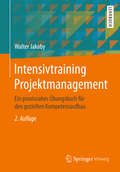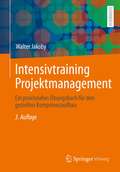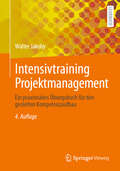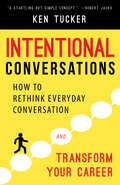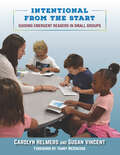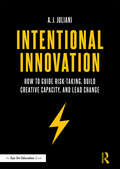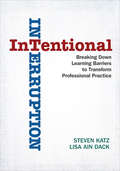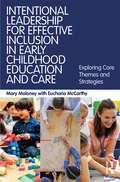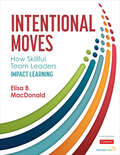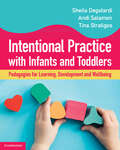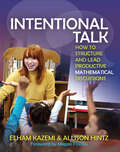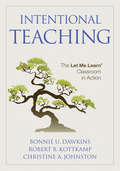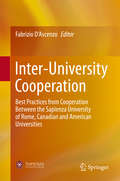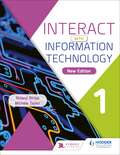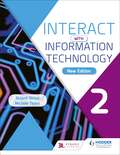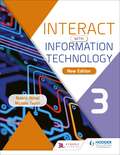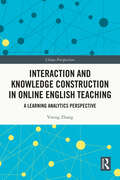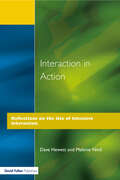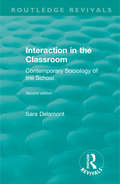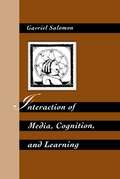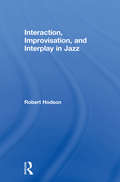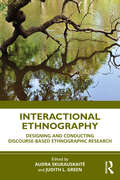- Table View
- List View
Intensivtraining Projektmanagement: Ein praxisnahes Übungsbuch für den gezielten Kompetenzaufbau
by Walter JakobyIn diesem Übungsbuch werden die Kenntnisse des Projektmanagements kompakt zusammengefasst und durch Verständnisfragen überprüft. Die Anwendung wird mit Hilfe praxisnaher Übungsaufgaben und kommentierter Lösungen intensiv trainiert, so dass sich das Buch als unmittelbare Vorbereitung auf Klausuren und Prüfungen eignet.Im abschließenden Praxisprojekt werden alle Methoden an einem durchgängigen Beispiel angewendet. Es kann als anschauliches Vorgehensmuster für das Planen und Steuern eigener Projekte verwendet werden und ermöglicht so einen nahtlosen Übergang vom Aufbau der Kompetenzen zu deren praxisgerechter Nutzung.
Intensivtraining Projektmanagement: Ein praxisnahes Übungsbuch für den gezielten Kompetenzaufbau
by Walter JakobyIn diesem Übungsbuch werden die Kenntnisse des Projektmanagements zunächst kompakt zusammengefasst. Mit Hilfe von Verständnisfragen kann der Wissensstand dann überprüft und durch praxisnahe Übungsaufgaben mit kommentierten Lösungen vertieft werden, so dass sich das Buch als unmittelbare Vorbereitung auf Klausuren und Prüfungen eignet.In einem umfangreichen Praxisprojekt werden die erworbenen Kompetenzen anschließend zur Lösung der Aufgaben des gesamten PM-Lebenszyklus angewendet. Dies bildet ein anschauliches Vorgehensmuster für das Planen und Steuern von Projekten und ermöglicht so einen nahtlosen Übergang zu eigenen realen Projekten.
Intensivtraining Projektmanagement: Ein praxisnahes Übungsbuch für den gezielten Kompetenzaufbau
by Walter JakobyIn diesem Übungsbuch werden die Kenntnisse des Projektmanagements zunächst kompakt zusammengefasst. Mit Hilfe von Verständnisfragen kann der Wissensstand dann überprüft und durch praxisnahe Übungsaufgaben mit kommentierten Lösungen vertieft werden, so dass sich das Buch als unmittelbare Vorbereitung auf Klausuren und Prüfungen eignet.In einem umfangreichen Praxisprojekt werden die erworbenen Kompetenzen anschließend zur Lösung der Aufgaben des gesamten PM-Lebenszyklus angewendet. Dies bildet ein anschauliches Vorgehensmuster für das Planen und Steuern von Projekten und ermöglicht so einen nahtlosen Übergang zu eigenen realen Projekten.
Intentional Conceptual Change
by Paul R. Pintrich Gale M. SinatraThis volume brings together a distinguished, international list of scholars to explore the role of the learner's intention in knowledge change. Traditional views of knowledge reconstruction placed the impetus for thought change outside the learner's control. The teacher, instructional methods, materials, and activities were identified as the seat of change. Recent perspectives on learning, however, suggest that the learner can play an active, indeed, intentional role in the process of knowledge restructuring. This volume explores this new, innovative view of conceptual change learning using original contributions drawn from renowned scholars in a variety of disciplines. The volume is intended for scholars or advanced students studying knowledge acquisition and change, including educational psychology, developmental psychology, science education, cognitive science, learning science, instructional psychology, and instructional and curriculum studies.
Intentional Conversations: How to Rethink Everyday Conversation and Transform Your Career
by Ken TuckerUsing six steps and a "SECRET" formula, international speaker, Fortune 500 strategist, and bestselling management author Ken Tucker explores the challenging skill sets required to navigate conflict and crucial conversations effectively. Drawing upon decades of experience in the corporate and government worlds, Tucker teaches leaders how to say what they really need to say and say it right so that their people and organizations execute the results they want and need. Intentional Conversations includes:Context and conversations that lead to good results and those that don't.How leaders can use the "SECRET" process to enhance their success at work and in life.Creative sidebars and QR media links that illustrate the principles in the book.
Intentional From the Start: Guiding Emergent Readers in Small Groups
by Susan Vincent Carolyn HelmersIntentional from the Start: Guiding Emergent Readers in Small Groups, Carolyn Helmers and Susan Vincent take a concentrated look at the often-underestimated reading and writing work that occurs during the emergent reading stages of literacy development (PreA -D) and the seemingly simplistic books we use to teach them in small-group guided reading. Though both may appear unsophisticated, these earliest readers and the texts we use to meet their needs are each unique and full of nuances that generally go overlooked.The authors explore how emergent readers learn best and position text levels appropriately in the service of students. They also turn their attention to a comprehensive exploration of the particular needs of emergent readers and how the work they do at text levels PreA -D lays a critical foundation necessary for them to continue growing successfully into text levels E and beyond. As they examine the needs of learners working at each emergent text level individually, the authors:Detail specific demands books in that text level make on young readers and the best ways to coach students as they work through themHighlight instructional procedures for reading, writing, and word study that can be implemented immediately at your small group tableSuggest optimal schedules, techniques, and formats for efficient instruction at that levelUnpack the book characteristics specific to that level and demonstrate ways to capitalize on them to intentionally support emergent readers and writers.With plenty of useful classroom examples, as well as additional online resources with literacy center ideas that correlate directly with the work students are doing at particular levels, this book is a resource your emergent reading teacher heart will reach for again and again.
Intentional Innovation: How to Guide Risk-Taking, Build Creative Capacity, and Lead Change
by A.J. JulianiAs the world changes, how do we educate differently so students, teachers, and staff are empowered to thrive in this environment? In this new book from bestselling author A.J. Juliani, you’ll learn a clear process to guide risk-taking and lead change so you can be intentional about innovation in your classroom, school, and life. Juliani shows why we need intentional innovation and how to implement it effectively using the PLASMA framework: What to Praise, Look For, and Assess Support What is Different Make Time for Creative Work Allow for the New and Unknown You’ll also gain insights on celebrating failing and learning, creating conditions for creativity, and leading the change. Whether you are a technology and innovation coach, a teacher, or an administrator, Intentional Innovation will motivate you to take risks, be up to date on the latest research, and manage strong working relationships designed to help students succeed beyond school doors. It’s not just about technology for change, but about fostering relationships to motivate, inspire, and challenge us to step out and lead in a future that is exciting and unknown.
Intentional Interruption: Breaking Down Learning Barriers to Transform Professional Practice
by Steven Katz Lisa Ain DackWe interrupt this program to bring meaningful change to professional learning! Big ideas can sometimes get stuck on the way to becoming real change. The authors explain the secret to getting unstuck: interrupting the status quo of traditional activity-based professional development to help educators embrace permanent changes in thinking and behavior. You can enable true learning by: Building a focus on learning, collaborative inquiry, and formal and informal instructional leadership in schools Recognizing the psychological processes involved in adult learning, and overcoming the psychological biases and barriers to change Using tools and strategies such as critical friend relationships, learning conversations, task sheets, and protocols
Intentional Leadership for Effective Inclusion in Early Childhood Education and Care: Exploring Core Themes and Strategies
by Mary Moloney Eucharia McCarthyIntentional leadership can unite, motivate and empower all educators to work towards the common goal of creating a truly inclusive culture in which all children, with or without disabilities, are supported and enabled to fully participate in every aspect of daily life and learning. This book recognises diverse manifestations of special educational needs, from communication difficulties and delays in learning, to social and physical disabilities, and considers the ways in which these needs might be embraced within inclusive mainstream settings. Key to this is robust and purposeful leadership that removes barriers to learning, changes existing attitudes and values, motivates staff and foregrounds holistic learning opportunities and experiences. Chapters draw on theoretical models, reflect on international and national policies, and consider topics including: the image of the child physical, aesthetic and temporal aspects of the learning environment relational pedagogy long-, medium- and short-term planning the role of assessment collaborative working with parents, families and other professionals. In-depth descriptions of behaviours and leadership strategies, practice scenarios and activities support the reader’s understanding. Intentional Leadership for Effective Inclusion in Early Childhood Education and Care is a comprehensive guide for students, teachers and practitioners involved in Early Childhood Education and Care, Social Care and Early Intervention programmes.
Intentional Moves: How Skillful Team Leaders Impact Learning
by Elisa B. MacDonald CorwinFor maximum impact, let intention drive your actions. Leading a team means more than running meetings. It’s leading collaborative learning for continuous improvement. Like effective teachers in the classroom, skillful team leaders decide what they are aiming to achieve and make small, intentional moves to produce powerful learning outcomes for teachers and students. In this long-awaited follow-up to her best-selling book, The Skillful Team Leader, acclaimed educator Elisa MacDonald presents nearly 150 effective moves, organized by intention, for any educator who leads a team. In this book, you′ll find strategies to lead with purpose and direction, including how to: foster an inclusive environment and strengthen team trust interrupt bias and cultivate diverse perspectives navigate resistance and manage conflict facilitate data analysis lead peer observation assess your team’s collaboration and so much more! Written in a practitioner-friendly format with a light tone and relatable stories, this is a must-have book for all team leaders and those who support them in your school.
Intentional Moves: How Skillful Team Leaders Impact Learning
by Elisa B. MacDonald CorwinFor maximum impact, let intention drive your actions. Leading a team means more than running meetings. It’s leading collaborative learning for continuous improvement. Like effective teachers in the classroom, skillful team leaders decide what they are aiming to achieve and make small, intentional moves to produce powerful learning outcomes for teachers and students. In this long-awaited follow-up to her best-selling book, The Skillful Team Leader, acclaimed educator Elisa MacDonald presents nearly 150 effective moves, organized by intention, for any educator who leads a team. In this book, you′ll find strategies to lead with purpose and direction, including how to: foster an inclusive environment and strengthen team trust interrupt bias and cultivate diverse perspectives navigate resistance and manage conflict facilitate data analysis lead peer observation assess your team’s collaboration and so much more! Written in a practitioner-friendly format with a light tone and relatable stories, this is a must-have book for all team leaders and those who support them in your school.
Intentional Practice with Infants and Toddlers: Pedagogies for Learning, Development and Wellbeing
by Sheila Degotardi Andi Salamon Tina StratigosChildren in their first three years of life learn, develop and grow at a faster rate than at any other time, with early childhood teachers and educators playing a vital role in providing them with the very best learning opportunities. Intentional Practice with Infants and Toddlers focuses on purposeful pedagogical approaches, equipping pre-service and practising early childhood teachers and educators with the professional knowledge and strategies required to implement effective infant and toddler pedagogies in early childhood education settings. Drawing on a growing body of research and evidence, the book covers topics such as educational programs, pedagogy as care, health and physical wellbeing, creating a language-rich environment, establishing social cultures, and documenting, planning for and communicating learning. Features include spotlight boxes to explore relevant research, theories and practices; vignettes to open each chapter; reflection questions; and links to the Early Years Learning Framework and National Quality Standards.
Intentional Talk: How to Structure and Lead Productive Mathematical Discussions
by Elham Kazemi Allison HintzMath teachers know the first step to meaningful mathematics discussions is to ask students to share how they solved a problem and make their thinking visible; however, knowing where to go next can be a daunting task. In Intentional Talk: How to Structure and Lead Productive Mathematical Discussions , authors Elham Kazemi and Allison Hintz provide teachers with a framework for planning and facilitating purposeful math talks that move group discussions to the next level while achieving a mathematical goal.Through detailed vignettes from both primary and upper elementary classrooms, the authors provide a window into how teachers lead discussions and make important pedagogical decisions along the way. By creating equitable opportunities to share ideas, teachers can orient students to one another while enforcing that all students are sense makers and their ideas are valued. They examine students' roles as both listeners and talkers, offering numerous strategies for improving student participation.Intentional Talk includes a collection of lesson planning templates in the appendix to help teachers apply the right structure to discussions in their own classrooms.
Intentional Teaching: The Let Me Learn® Classroom in Action
by Bonnie U. Dawkins Dr Robert B. Kottkamp Christine A. JohnstonFollow a teacher’s year-long journey to create a student-centered classroom! When learners understand how to use their unique learning processes with intention, they open a whole new world of learning. This inspiring book focuses on the Let Me Learn® (LML) system, a student-centered teaching method that transforms learning differences into strengths. This resource offers: <p><p> One teacher’s experience with this cutting-edge approach in her classroom <p> A widely researched approach that gives students metacognitive skills for life <p> Five essential tools of the LML Advanced Learning system <p> Voices of students as they discover their own and others’ ways of learning
Inter-University Cooperation
by Fabrizio D'AscenzoInter-university cooperation across the world has shown several positive outcomes in terms of knowledge exchange as well as R&D benefits. This book portrays best practices of inter-university cooperation between Italian and American universities, while featuring agreements of Sapienza University of Rome. This book presents conceptual and implementation specifics of cooperation, policy perspectives, as well as a selection of framework agreements of current cooperation initiatives. Aimed at university professors, education and R&D policy makers, this book shall prove worthy as a guideline to initiate and implement inter-university cooperation globally.
Interact with Information Technology 1 new edition
by Michele Taylor Roland BirbalProvide an accessible approach to theory and practice with this new edition updated to comprehensively cover recent IT developments and the latest Caribbean curricula for Forms 1 to 3 (Grades 7 to 9).- Consolidate learning through a range of question types such as Multiple Choice, True or False, Short Answer and a fun Crossword puzzle.- Build critical thinking and project work skills with research and STEM projects using real life situations.- Develop understanding with new topics covered such as computer ethics, algorithm development, emerging careers.The answers can be found here: www.hoddereducation.co.uk/interactanswers
Interact with Information Technology 2 new edition
by Michele Taylor Roland BirbalProvide an accessible approach to theory and practice with this new edition updated to comprehensively cover recent IT developments and the latest Caribbean curricula for Forms 1 to 3 (Grades 7 to 9).- Consolidate learning through a range of question types such as Multiple Choice, True or False, Short Answer and a fun Crossword puzzle.- Build critical thinking and project work skills with research and STEM projects using real life situations.- Develop understanding with new topics covered such as computer ethics, algorithm development, emerging careers.The answers can be found here: www.hoddereducation.co.uk/interactanswers
Interact with Information Technology 3 new edition
by Michele Taylor Roland BirbalProvide an accessible approach to theory and practice with this new edition updated to comprehensively cover recent IT developments and the latest Caribbean curricula for Forms 1 to 3 (Grades 7 to 9).- Consolidate learning through a range of question types such as Multiple Choice, True or False, Short Answer and a fun Crossword puzzle.- Build critical thinking and project work skills with research and STEM projects using real life situations.- Develop understanding with new topics covered such as computer ethics, algorithm development, emerging careers.The answers can be found here: www.hoddereducation.co.uk/interactanswers
Interaction and Knowledge Construction in Online English Teaching: A Learning Analytics Perspective (China Perspectives)
by Yining ZhangWithin a Chinese English as a Foreign Language (EFL) learning context, this book investigates how teachers and learners interacted and articulated their understanding of English for Research Publication Purposes (ERPP)-related knowledge in a synchronous EFL classroom.The outbreak of the COVID-19 Pandemic changed the way people receive education, causing an almost overnight switch from on-campus instruction to distance learning. Under the use of three different learning analytics approaches, this book has moved beyond the usual descriptive understanding of the online learning process to an in-depth exploratory and inferential analysis of the entities, structures, relations, and processes of learning. The findings enrich current understandings of the complexity of ERPP teaching and learning in synchronous learning contexts. These findings also drive us to rethink and reshape the way ERPP instruction is delivered post-pandemic. An essential read for students and scholars of education and academic English. This book will also be a vital source for researchers in the field of learning analytics, data analysis, and data interpretation in language teaching and learning.
Interaction and Knowledge Construction in Online English Teaching: A Learning Analytics Perspective (ISSN)
by Yining ZhangWithin a Chinese English as a Foreign Language (EFL) learning context, this book investigates how teachers and learners interacted and articulated their understanding of English for Research Publication Purposes (ERPP)-related knowledge in a synchronous EFL classroom.The outbreak of the COVID-19 pandemic changed the way people receive education, causing an almost overnight switch from on-campus instruction to distance learning. Under the use of three different learning analytics approaches, this book has moved beyond the usual descriptive understanding of the online learning process to an in-depth exploratory and inferential analysis of the entities, structures, relations, and processes of learning. The findings enrich current understandings of the complexity of ERPP teaching and learning in synchronous learning contexts. These findings also drive us to rethink and reshape the way ERPP instruction is delivered post-pandemic.An essential read for students and scholars of education and academic English. This book will also be a vital source for researchers in the field of learning analytics, data analysis, and data interpretation in language teaching and learning.
Interaction in Action: Reflections on the Use of Intensive Interaction
by Dave Hewett Melanie NindFirst Published in 1998. The authors’ aim in editing Interaction in Action is to follow up on the thinking and practical guidance contained in their previous work on Intensive Interaction: They hope to illustrate that Intensive Interaction is not just something that goes on in hospital schools. Here we see the approach used not only by teachers, but also by speech therapists, occupational therapists, social workers, psychologists and parents. We see the approach used in people's homes as well as in education and day centres. The contributors have been asked to share their insights, the way they think about Intensive Interaction as well as the way that they 'do' it. This means that the chapters contain both reflective analysis and vivid description. The contributions illustrate how Intensive Interaction has grown and developed as an educational approach and as a way of being with people, and they illustrate the impact on all those involved.
Interaction in the Classroom: Contemporary Sociology of the School (Routledge Revivals)
by Sara DelamontPublished in 1983, this second edition builds on the success of the first edition which provided the first sociological account of classroom life. In the seven years between editions great activity and interest in classroom studies ensued, the author therefore revised and expanded her text to accommodate further material. In this book the reader is taken into a variety of classrooms, shown the methods and techniques of classroom observation and encouraged to get behind the deceptively familiar façade. Attention is paid to the context of the classroom, to teacher and pupil careers, and to the curriculum. At the heart of the book is an emphasis on understanding how the participants make sense of classroom life.
Interaction of Media, Cognition, and Learning: An Exploration of How Symbolic Forms Cultivate Mental Skills and Affect Knowledge Acquisition
by Gavriel SalomonThe educational use of television, film, and related media has increased significantly in recent years, but our fundamental understanding of how media communicate information and which instructional purposes they best serve has grown very little. In this book, the author advances an empirically based theory relating media's most basic mode of presentation -- their symbol systems -- to common thought processes and to learning. Drawing on research in semiotics, cognition and cognitive development, psycholinguistics, and mass communication, the author offers a number of propositions concerning the particular kinds of mental processes required by, and the specific mental skills enhanced by, different symbol systems. He then describes a series of controlled experiments and field and cross-cultural studies designed to test these propositions. Based primarily on the symbol system elements of television and film, these studies illustrate under what circumstances and with what types of learners certain kinds of learning and mental skill development occur. These findings are incorporated into a general scheme of reciprocal interactions among symbol systems, learners' cognitions, and their mental activities; and the implications of these relationships for the design and use of instructional materials are explored.
Interaction, Improvisation, and Interplay in Jazz
by Robert HodsonInteraction, Improvisation, and Interplay in Jazz Performance offers a new and exciting way to listen to and understand jazz. When describing a performance, most jazz writers focus on the improvised lines of the soloist and their underlying harmonic progressions. This approach overlooks the basic fact that when you listen to jazz, you almost never hear a single line, but rather a musical fabric woven by several musicians in real time. While it is often pragmatic to single out an individual solo line, it is important to remember that an improvised solo is but one thread in that fabric; and it is a thread supported by, responded to, and responsive of the parts being played by the other musicians in the group. Interaction, Improvisation, and Interplay in Jazz Performance explores the process of player interaction in jazz, and the role this interaction plays in creating improvised music, including: jazz improvisation through theory and analysis musical roles, behaviours and relationships harmony, interaction and performance Interaction, Improvisation, and Interplay in Jazz Performance will appeal to students of jazz history, composition, and performance, as well as to the general jazz audience.
Interactional Ethnography: Designing and Conducting Discourse-Based Ethnographic Research
by Audra SkukauskaitėFocusing specifically on Interactional Ethnography (IE) as a distinct, discourse-based form of ethnography, this book introduces readers to the logic and practice behind IE and exemplifies the logic of ethnographic inquiry through a range of example-based chapters. Edited by two of the foremost scholars in the field of IE, this book brings together a body of work that has until now been largely dispersed. Illustrating how IE intersects with ethnographic methods – including observation, interviews, and fieldwork – the book highlights considerations relating to data analysis, researcher positionality, and the ethics of engaging participants in research. Offering examples of IE in international contexts and across a range of social science and educational settings, the book provides foundational principles and key examples of IE to guide readers’ work. This book offers researchers, scholars, and teacher educators a definitive, novel contribution to current methodological literature on IE broadly, and will be of particular use to ethnographers starting out in their career. Due to the interdisciplinary nature of the volume in illustrating the use of IE in a range of educational sub-disciplines, the book’s relevance extends to the fields of medical education, teacher education, arts and literacy research, as well as providing situated examples of IE in settings with relevance to the social sciences, anthropology, and cultural studies.
